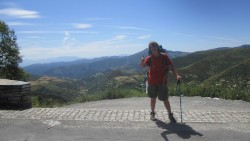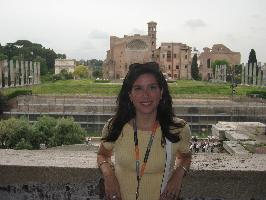Image: IDS Faculty – Dr. Jessica Magnani
“Interdisciplinary studies are a holistic approach to understanding and living in the contemporary world. These courses resonate in our increasingly globalized world because they offer students the possibilities of engaging simultaneously with multiple disciplines and world-views, of considering how world events or artistic movements can have resonances in multiple disciplines and in various parts of the world, and of participating in intellectual exchanges that broaden their understanding of themselves and those around them.”
“The best part of teaching an interdisciplinary course is the journey we take with our students. Professors incorporate Socratic approaches to learning, as well as opportunities to experience the material first-
hand. The course Dr. Brandy Stark and I teach—IDS 1337H Modern Cultures, Global Insights–features trips to local cultural sites as a way of immersing students in new cultures. It’s a small way to experience the world at home. As a result of these shared experiences in and out of the classroom, we tend to form tightly-knit learning communities where students feel comfortable asking difficult questions and talking about controversial subjects. Interdisciplinary studies can be really life-changing for our students.”

Image: IDS Faculty – Professor Linda Yakle
“I earned a Master’s degree [from the University of South Florida] and completed the coursework for a doctorate in Literature. I have taught English and Humanities courses for many years at St. Petersburg College. I love to teach. I love the students, I love the material in my disciplines, I love the performance! I also love to travel: Spain, France, Switzerland, Italy, Norway, England, Scotland, Ireland, Mexico, Peru, Portugal, Germany, the American West and Southwest are among my favorites. If you take my humanities and Interdisciplinary Studies courses expect to see slides of my travel destinations and maybe hear a tale or two [especially about the Camino or Way of St. James to the Cathedral of Santiago de Compostela in northwestern Spain].”
IDS Faculty – Dr. Greg Byrd
“The interdisciplinary approach of IDS classes connects with me in so many ways and that really carries over into my teaching. You see, my undergraduate education at Eckerd College was an integrated interdisciplinaryexperience. Even though you might be in a philosophy class, that professor would likely have taught in the Western Heritage course, which was very much like IDS. So you never really knew when a prof would hold you accountable for something he or she knew you had learned in another class. And we learned that ideas from one field connected into other fields. We find this interconnectedness in all of learning and it’s what makes learning things exciting. Our world is not really divided into literature, art, music, philosophy and history—all of these things take place simultaneously and affect each other. So, when I have the chance to teach IDS and to actively make connections and encourage students to make connections between disciplines, it ignites the interest that seized me when I was the same age as our students. Just as exciting is the synergy that happens between professors in IDS. I love (students do, too) the way that the professors will riff off one another, connecting our specialties to what might be going on in another’s lecture. Sometimes we debate or challenge one another, other times we identify exciting connections between each other’s fields.”
IDS Faculty – Dr. Nan Morelli-White
“I took my degrees primarily in English literature from the University of South Florida and Florida State University; for my doctorate, I focused on drama as a genre. Besides loving what I do, I especially love spending time traveling, particularly in the UK. Subjects Taught: Humanities, Interdisciplinary Studies & Honors, and English.”
“IDS is BLISS.”
IDS Faculty — Dr. Richard Mercadante
Rich Mercadante joined St. Petersburg College in 2006. He has been teaching for 25 years. He currently teaches courses in speech communication, philosophy, and Interdisciplinary Studies. Dr. Rich Mercadante is also the SPC Faculty Senate President.
IDS Faculty – Dr. Brandy Stark
“I have had a long running history with the IDS program. I was a member of its inaugural class when the program first started in the 1990s. From a student perspective I loved it. The original classes were 9 credits and encompassed humanities, composition, speech, and literature. It was easy for me to plan each semester since a single IDS class and one to two other courses filled my full time student status. I could plan hours in which I could work, study, and even for some down time. It streamlined my learning process and allowed the topics to naturally interweave. It was easy to see the relationships between literature and speech, culture and art. As such, it helped to reignite my academic passions and ultimately led me to my current degrees. Now as SPC faculty, I am very happy to teach in the IDS program. The classes are now 6 hours rather than 9, but the process is just as exciting. Classes are taught jointly with another faculty member. We give multiple perspectives to the students through lectures, projects, presentations, guest speakers, and field trips. It is exciting to walk into the classroom twice a week to greet enthusiastic students and co-faculty. From both perspectives, I find it is a true strength that St. Petersburg College offers these courses. I would encourage students to seriously consider this program.”
IDS Faculty – Dr. Julia Rawa-White
“I earned a B.A. in English from Rollins College, M.A. in English from the University of South Florida, Ph.D. in English from the University of South Florida, and Certificate in Digital Humanities from Oxford University. I work closely with our Interdisciplinary Studies Program and edited the inaugural volume of our Interdisciplinary Journal. I also launched the online version of the publication as well as our digital IDS project. My courses include Interdisciplinary Studies I & II, British/American Literature I &II, World Literature I & II, and Western Humanities I & II. I am committed to innovative, interdisciplinary teaching. To that end, I encourage students to think critically, examine connections, and to appreciate, as Aldous Huxley rightly observes, that “every [individual] who knows how to read has it in his power to magnify himself, to multiply the ways in which he exists, to make his life full, significant and interesting.”
IDS Faculty – Professor Orlando Pizana
“My current scholarship (my teaching reflects this) is concentrated on Constructivism, or what is the interplay between public versus private spheres of understanding and the wonderful part that critical writing plays in the crossing of curriculum and disciplines that are a part of this teaching. Learning should be exciting, thought-provoking — even daring, and certainly not a roll-out of repeated lessons gone stale for its lack of change. Change [is] an action word; it denotes exertion or an act on our part. It is also a characteristic of what students are seeking in taking a college course. Education changes people; it especially changes them when their understanding of language and literature is improved upon. However, there is an important consideration: Change — real change — is enhanced by those who are willing to accept and work with what is their un-identical nature. What that means is that students and teachers must be willing to work with ideas and things different from what they have known or experienced before. Follow that principle, and change is certainly evident on the horizon.”

